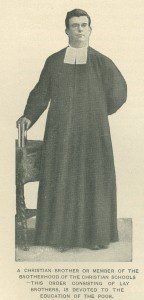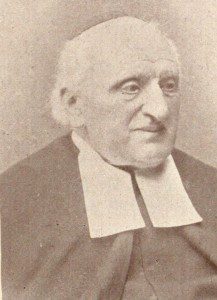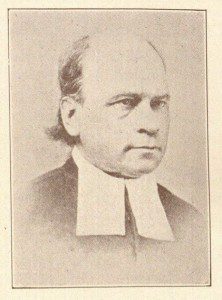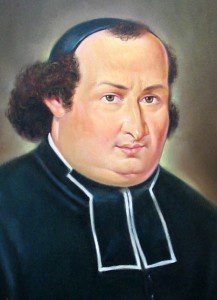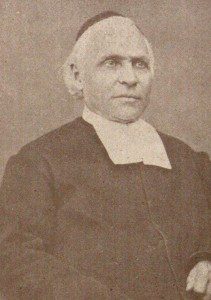The Institute of the Brothers of the Christian Schools is a teaching congregation, founded in the year 1680, St. John Baptist de la Salle, priest, and Doctor of Divinity. The establishment of this important society is the fruit of the prayers of a pious association, organized in France about the middle of the seventeenth century for the purpose of obtaining from heaven Christian teachers for the children of the people. Henry Barnard, the founder of the Normal School in this country, in praising the German people for organizing a system of education under the administration of the civil power, said: “But not to Germany, nor to nay one people, nor to any civil authority anywhere, but to the Catholic Church, belongs the credit of first instituting the public school, or rather the parochial school for the elementary education of the poor.”
The Church instituted the principles, methods, and instrumentalities for a system of popular education many centuries ago, and she has been eminently successful in the administration of those principles and methods. They produced such monarchs as Alfred, Louis IX and Sixtus V; such philosophers as Thomas Aquinas and Duns Scotus; such statesmen as Sir Thomas More and St. Louis; such knightly heroes as Bayard; such poets as Dante and Chaucer; such architects as Arnulf and Brunelleschi; such artists as Michael Angelo and Raphael; such historians as Otto and Froissart; and better than all, such saints as SS. Benedict, Dominic and Francis Assisi.
The object of the Institute of the Brothers of the Christian Schools is the sanctification of its members, and the Christian education of youth. Although the founder of the Congregation was a priest, none of its members may aspire to the priesthood. Soon after its foundation, the Society spread with rapidity through France, and was finally raised to the rank of a religious congregation by Pope Benedict XIII, in 1725.
The saintly founder, John Baptist de la Salle, was born in Rheims, France, April 30, 1651, and when only eight years of age was placed in the University of his native city. When he was eleven years old, he consecrated himself to the service of the altar, and received the tonsure. In 1666, a canonry was conferred upon him, and later he entered the seminary of St. Sulpice, and distinguished himself by his brilliant intellect and application to study. He was ordained to the priesthood April 9, 1678, and in 1681, he resigned his canonry, gave away everything he possessed to charity, and devoted his future life to a new society of teaching brotherhood, which he called the Brothers of the Christian Schools. In 1684, he permitted twelve of the new Order to take triennial vows of obedience and stability. The institution of the preparatory novitiate in which young men are trained for the Society, owes its origin to Blessed de la Salle. In 1694, after Society became well established, and began to spread, twelve of the Brothers took perpetual vows, and sometime after this the founder prepared the rules of his Community. In 1717, Blessed de la Salle resigned his office on account of ill health, and after a long life of activity, he died April 7, 1719. At his death the Institute comprised twenty-seven houses, two hundred and seventy-four Brothers, and nine thousand, eight hundred and eighty-five scholars. The founder was canonized by Pope Leo XIII, on May 24, 1900.
In 1725, the Institute was approved by Pope Benedict XIII. During the French Revolution, the Order was suppressed, and many of its members perished on the guillotine. After the Revolution, the Brothers reunited in 1802, and since that time have continued their great work all over the world. But in no other country, except France, has the Congregation developed so rapidly as in America. Under the patronage of the hierarchy and the clergy, it carries on with success, its glorious mission. Since its advent to the United States in 1846, it has given to the state many of its most prominent and loyal citizens, and to the Church, some of its most illustrious bishops and priests. The educational work conducted by the Brothers embraces primary, secondary and high schools; academies, colleges and normal schools for secular teachers; orphanages and protectories, art, trades, business and agricultural schools; boarding schools, Sunday schools and night schools. No endowment is required for admission. Among the impediments to admission are, the necessity of providing for parents; any grave or apparent deformity; inability to pay debts contracted personally; obligation as guardian, or the management of property. Candidates must be of good moral character, of sociable disposition, detachment from worldly goods or interests, zeal for the glory of God, for the salvation of children, and for one’s own perfection. The vows made in this Institute are the simple vows of poverty, chastity, obedience, stability, and of teaching gratuitously. They are made for one year, for three years, and finally for life. Candidates for perpetual vows must be twenty-eight years old and have spent eight years in the Society.
The Order of the Christian Brothers in the United States is divided into four provinces; New York, Baltimore, St. Louis and San Francisco. Each of these has its respective junior and senior novitiates and its normal school. Applications for admission may be made by letter to Rev. Brother Austin, Provincial, Armendale, Md. The junior novitiate is a preparatory school for boys between the ages of thirteen and sixteen years, who desire to become Christian Brothers. Their time in this department is divided between prayer, study, recreation, and manual work. They are separated from the other departments of the novitiate, and have their own study halls, playgrounds, etc. They receive a thorough Christian formation, and at the same time every opportunity is afforded them to acquire a mental and physical discipline that will fit them for the active duties of a teacher’s life. When he has completed his school curriculum, the young candidate is advanced to the senior novitiate, where he receives the habit of the Christian Brothers, and is trained for the religious life.
The Christian Brothers have charge of the great Catholic Protectorate of New York, where thousands of boys are educated and trained to become good Catholics and citizens. The Brothers are the accredited leaders in the field of popular education, wholly in sympathy with the needs of our expanding natural life, and alert in adopting the best educational methods. From year to years their colleges and schools send out large classes of young men imbued with the spirit of honesty, personal purity, respect for law, and a patriotic regard for the institutions of their country.
Henry Coyle, Theodore Mayhew, and Frank S. Hickey, eds., Our Church, Her Children and Her Institutions (Two Volumes) (Boston: Angel Guardian Press, 1908), II, 159-161.

